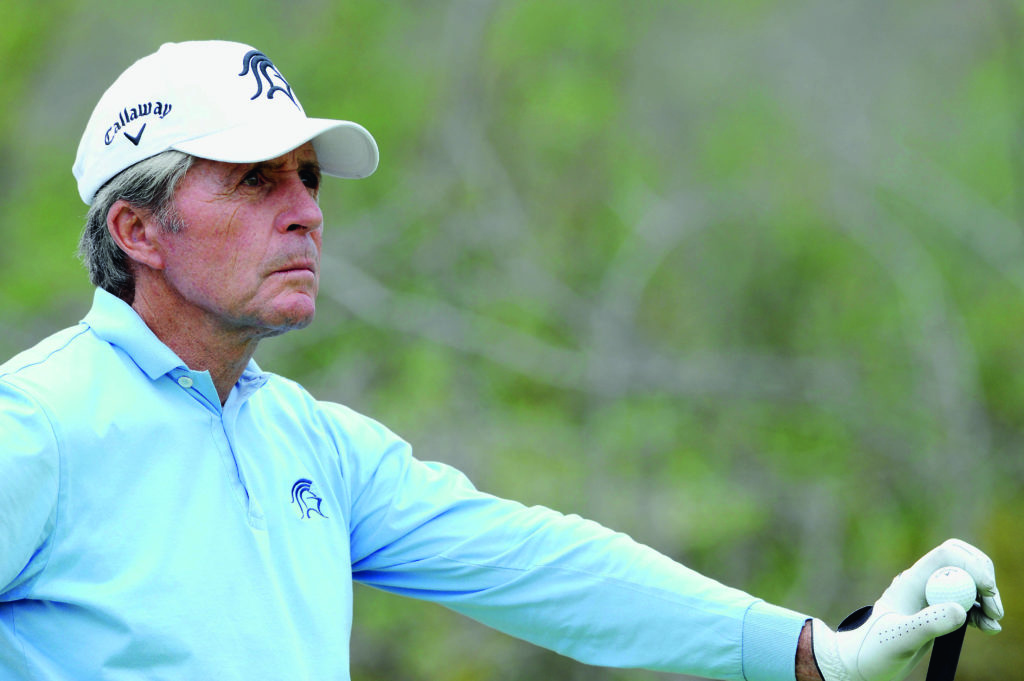He’s the elder statesman of golf in South Africa who fought his way up from nothing. He has 165 worldwide tournament victories, including nine major championships. The man they call the Black Knight, who has gained so much from the game, now wants to give back.
At the Zimbali Country Club in KwaZulu Natal, where he was host to the Gary Player Invitational in November, 2012, Player, 78, talks about his round the previous day.
“Yesterday, I spent the day with this young boy with lupus and I changed his life, but he also changed my life. He was smiling throughout and I thought to myself, ‘Here’s a guy who could die any minute,’ yet he was smiling the whole way. The problems you think you have are not really that bad and that brings things into reality,” says the legendary golfer.
Player started out as a poor kid in Booysens, south of Johannesburg, who began playing golf at the nearby South Downs Country Club. Later, he began dating the daughter of the greenskeeper and today they have 21 grandchildren.
“Gratitude is the mother of all attributes. When I check out of a hotel these days, I say thank you for the bath, toilet and the bed because most people in the world don’t have those things. The sense of entitlement is something we have to be very careful of in the world we live in today. Nobody’s entitled to anything. You have to go and work for it and earn it.
Loading...
“Thank goodness I was a very poor boy and… I really struggled. It was the best thing that ever happened to me. That’s the reason I became a world champion. So many people have so much ability and never become world champions because they’ve never had to really endure any real adversity,” he says.
When Player completed the grand slam, all four grand slam titles, by winning the US Open in 1965, he famously gave his winner’s cheque back to the organizers, saying it should go to cancer research and the development of junior golf programs by the United States Golf Association. As his regular playing career came to an end, he formed the Player Foundation, which has raised more than $50 million to help alleviate poverty globally.
“At my age, to get on a plane and fly to China, India, Dubai, America, Europe and then to South Africa is not easy. Every time I do that, I seem to get invigorated when I see what’s happening. I go to India and I do a golf clinic with 300 young Indians. You go to China and—with Coca-Cola being this phenomenal sponsor—you raise 20 million RMB ($3,2 million) for children with AIDS, and you see these kids with no mother and father; and they’re living with their grandfather. You see things that are so sad and you are able to help them in their lives. It’s very gratifying,” he says.
“That’s why golf and golfers are the greatest catalyst for raising money. The American PGA tour will have raised $2 billion by 2014—more than any other team sports put together. Most pro golfers have a charity and are giving back, and I think this is fantastic.”
While Player’s major wins account for a large portion of South Africa’s major tally, the Rainbow Nation has experienced a surge in victories post-1992. South African golfers have won nine majors since then, including a major in 2012, 2011 and 2010. Player puts this dominance on the world stage down to structures in South Africa.
“South Africa is remarkable for a small country. We’ve won more major championships than any country post-war; other than the United States. We have a lot of golf academies. I have the Gary Player Golf academy at the World of Golf in Johannesburg, we have Ernie Els’ academy and we have Louis Oosthuizen who has started one now. Sally Little is trying to get things going for the ladies,” he says.
“We have the right system here; we have the right climate and the right golf courses. Our guys have done so well and they’re great ambassadors for our country… Golf is played in almost every country I know; so the coverage we are getting is fantastic.”
As for the performances of South African golfers in 2012, Player said he was pleased in particular with Ernie Els’ win at the Open.
He noted in particular the way the golfer known as ‘The Big Easy’ played the 72nd hole, which he birdied to ultimately seal the win over Australian Adam Scott.
“Watching the British Open was interesting. He came to the last hole and his course management was brilliant. Ernie said to himself, ‘If I birdie this hole, I have an outside chance of winning.’ And that’s just what he did.”
Player has often been asked what his greatest achievement in the game is and he always gives the same answer.
“Winning the grand slam as a senior… There are five of us that won the grand slam on the regular tour, but I’m the only one that’s won the grand slam on the senior tour. No rugby player, no cricket player, no tennis player, no other sportsman is playing their sport at that age with any success. It is a bit easier to do that in golf than other sports, but to go there after 50 and win the senior grand slam; that is my great joy. I never take that for granted. It’s a gift from the man above.”
Player will be remembered for his majors; he may want to be remembered for his charity, but there is no doubt he will leave behind a legacy as a humble boy from Booysens who took on the world and won. FL
Loading...
